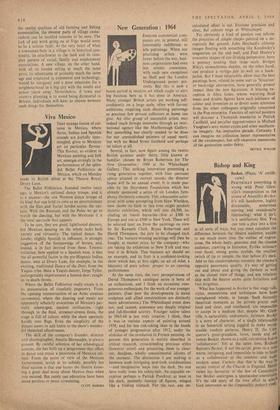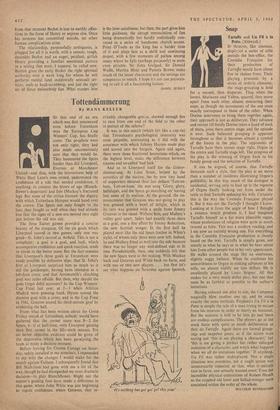Bishop and King
Becket. (Plaza; 'A' certifi- cate.)
PRACTICALLY everything is wrong with Peter Glen- ville's transposition to the screen of Anouilh's Becket. It's still handsome, highly
discussable, sometimes moving and occasionally fascinating: what it isn't, is a satisfactory film. You can turn a play into a film in all sorts of ways, but you must calculate the difference between the theatre audience, unable to see much more than the outline of expres- sions, the whole body, gestures; and the cinema audience, crawling in fearsome, fly-like intimacy over faces, seeing pores, eyelids, the smallest twitch of lip or temple, the tear before it's shed. Add to this claustrophobic intensity the cinema's opposite panoramic quality, it's way of getting out and about and giving the farthest as well as the closest view of things, and any relation- ship with the theatre seems quite fortuitous and best forgotten.
What has happened in Becket is that stagy talk, styles, mannerisms and techniques have been transplanted whole, in lumps. Such blatantly theatrical moments as the private prayer said loud and clear, and overheard, are impossible to accept in a medium that, despite Mr. Glen- ville, is naturalistic, undramatic, intimate. Becket is a story of character, of a single relationship in an historical setting juggled to make recog- nisable modern patterns. Henry II, the Con- queror's great-grandson, loves, needs and ad- vances Becket, shown as a cold, calculating Saxon 'collaborator.' Yet at tbe same time, Richard Burton's Becket, if not the script, gives us a man warm, intriguing, and impossible to take to heart as a collaborator in the emotive and nasty modern sense. Certain that this is the way to secure control of the Church in England, Henry raises his favourite to the See of Canterbury' but Becket undergoes a spectacular conversion' It's the old story of the love affair in which God intervenes as the (impossibly potent) rival:
from that moment Becket is lost to earthly affec- tions in the form of Henry or anyone else. Once his mistress has committed suicide, no other human complications arise.
The relationship, purposefully ambiguous, is plugged for all it is worth, with a remote, tough, desirable Becket and an eager, petulant, girlish Henry providing a familiar emotional pattern in a setting that must, I suppose, be called new. Burton gives the early Becket the right spiritual authority over a weak king for whom he will perform menial (and incidentally sensual) ser- vices, such as back-scrubbing; and just the right air of fierce melancholy fun. What escapes him is the later saintliness; but then, the part gives him little guidance, the abrupt renunciation of fun being dramatically but hardly realistically con- veyed in a series of handsome church scenes. Peter O'Toole as the king has a harder time of it and plays him as a shrill and unwinning despot, with a few moments of pathos among many where he fails (perhaps purposely) to seem even pitiable. Sir John Gielgud, Sir Donald Wolfit, Martita Hunt and Pamela Brown make much of the lesser characters and the settings are sumptuous to match. I hope it's not too patronis- ing to call it all a fascinating failure.
ISABEL QUIGLY



































 Previous page
Previous page